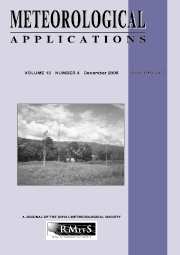Crossref Citations
This article has been cited by the following publications. This list is generated based on data provided by
Crossref.
Crevier, Louis-Philippe
and
Delage, Yves
2001.
METRo: A New Model for Road-Condition Forecasting in Canada.
Journal of Applied Meteorology,
Vol. 40,
Issue. 11,
p.
2026.
Eriksson, M
and
Norrman, J
2001.
Analysis of station locations in a road weather information system.
Meteorological Applications,
Vol. 8,
Issue. 4,
p.
437.
Siril, Y.
Askar, K.
and
Dougherty, M.
2004.
Expert system to calculate the coefficient of friction - an approach to enhance traffic safety.
Vol. 2,
Issue. ,
p.
803.
Bouilloud, Ludovic
and
Martin, Eric
2006.
A Coupled Model to Simulate Snow Behavior on Roads.
Journal of Applied Meteorology and Climatology,
Vol. 45,
Issue. 3,
p.
500.
Grimbacher, Tobias
and
Schmid, Willi
2006.
Detecting and nowcasting cloudiness using near‐surface temperatures on winter nights.
Meteorological Applications,
Vol. 13,
Issue. 2,
p.
127.
Kilpeläinen, Markku
and
Summala, Heikki
2007.
Effects of weather and weather forecasts on driver behaviour.
Transportation Research Part F: Traffic Psychology and Behaviour,
Vol. 10,
Issue. 4,
p.
288.
Andersson, A. K.
Gustavsson, T.
Bogren, J.
and
Holmer, B.
2007.
Geographical distribution of road slipperiness in Sweden, on national, regional and county scales.
Meteorological Applications,
Vol. 14,
Issue. 3,
p.
297.
Nordin, Lina
Gustavsson, Torbjörn
Bogren, Jörgen
Chen, Deliang
Li, Haisheng
and
Tian, Hua
2009.
ChiWI—a road weather index for China.
International Journal of Climatology,
Vol. 29,
Issue. 15,
p.
2337.
Konečný, David
2009.
Map support of winter road maintenance.
Geografie,
Vol. 114,
Issue. 3,
p.
218.
Pospišek, Tomáš
and
Konečny, David
2010.
Data and Mobility.
Vol. 81,
Issue. ,
p.
151.
Jian, Li
2010.
A combination of DE and SVM with feature selection for road icing forecast.
p.
509.
Marchetti, M.
Moutton, M.
Ludwig, S.
Ibos, L.
Feuillet, V.
and
Dumoulin, J.
2011.
Road Networks Winter Risk Estimation Using On-Board Uncooled Infrared Camera for Surface Temperature Measurements over Two Lanes.
International Journal of Geophysics,
Vol. 2011,
Issue. ,
p.
1.
Jonsson, Patrik
2011.
Classification of road conditions: From camera images and weather data.
p.
1.
Feng, Feng
and
Fu, Liping
2015.
Winter Road Surface Condition Forecasting.
Journal of Infrastructure Systems,
Vol. 21,
Issue. 3,
Hu, Yumei
Ou, Tinghai
Huang, Jianbin
Gustavsson, Torbjörn
and
Bogren, Jörgen
2018.
Winter hoar frost conditions on Swedish roads in a warming climate.
International Journal of Climatology,
Vol. 38,
Issue. 12,
p.
4345.
Qiu, Xin
Xu, Jing-xian
Tao, Jue-qiang
and
Yang, Qing
2018.
Asphalt Pavement Icing Condition Criterion and SVM-Based Prediction Analysis.
Journal of Highway and Transportation Research and Development (English Edition),
Vol. 12,
Issue. 4,
p.
1.
Ou, Tinghai
Hu, Yumei
Gustavsson, Torbjörn
and
Bogren, Jörgen
2019.
On the relationship between the risk of hoar frost on roads and a changing climate in Sweden.
International Journal of Climatology,
Vol. 39,
Issue. 5,
p.
2601.
Liu, Wenjiang
and
Rao, Zhongyang
2020.
Pavement Icing Forecasting Based on Long Short-Term Memory Network.
IOP Conference Series: Earth and Environmental Science,
Vol. 440,
Issue. 5,
p.
052070.
Liu, Wenjiang
and
Rao, Zhongyang
2020.
Road Icing Warning System Based on Support Vector Classification.
IOP Conference Series: Earth and Environmental Science,
Vol. 440,
Issue. ,
p.
052071.
Zhongyang, Rao
and
Chunyuan, Feng
2021.
Forecasting the pavement icing in traffic zone using long short-term memory.
Journal of Intelligent & Fuzzy Systems,
p.
1.

